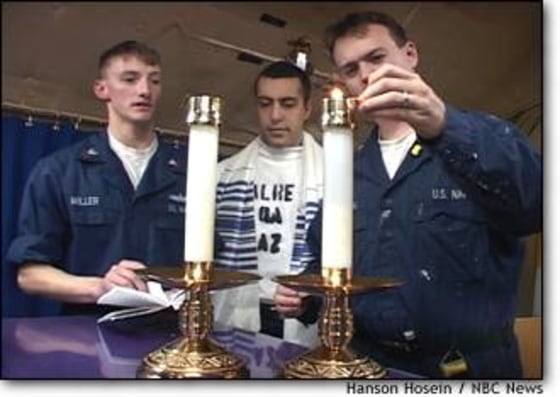On Friday at 12:45 p.m. one young man falls to his knees on his prayer rug as he surrenders to Allah. On Saturday at 9 a.m., in the same small chapel aboard the aircraft carrier USS Abraham Lincoln, a handful of sailors light Shabbat candles and read from a prayer book in Hebrew and English.
This ship of 5,655 men and women is a slice of sovereign U.S. territory floating in the Persian Gulf. It’s also a small city at sea that reflects American diversity as well as any cosmopolitan town back home. With 35 different religious services a week, Navy chaplains are determined to bring their shipmates into the faith — any faith.
“We’re the primary support system for the crew,” Protestant Chaplain Lt. Cmdr. Wesley Sloat said. “We give people the freedom to come to us whether they’re religious or not.
Since the Abraham Lincoln extended its mission in the Persian Gulf in January, Sloat’s phone has been ringing off the hook as the crew grappled with being away from home for so long. He estimates demand at the chaplaincy has risen around fifteen percent since then.
Something else has changed since the carrier left its home port last July in Everett, Wash. Chief Richard Kleiner, a Jewish reservist from New York City — who directs the ship’s “lay” services (the only ordained religious officials on board are Christian) — insisted on establishing a formal Muslim service for Fireman Naveed Muhammad, a Pakistani-born man from Detroit.
“When you’re away from home, you need something to feel that you’re at home,” Kleiner said. “This is home. We’re a community.”
CHANCE MEETING
Kleiner met Muhammad by chance one day when the young technician was working in the chapel. When he noticed the 20 year-old’s last name, he suddenly realized the ship had a Muslim crewmember.
“How come you don’t pick out a time? I can help you,” Kleiner said he told Muhammad.
Until then, Muhammad had been praying five times a day in a corner of his workshop. Kleiner wanted him to at least have a chance to pray once a week in a more spiritual place, even if it was the noisy room below the flight deck that did double duty as a Christian chapel and Jewish synagogue. Why couldn’t it also serve as a mosque on Fridays as well?
“I was surprised when Chief Kleiner overlooked everything else and said, you know what? Every Friday, you can come here and pray,” the soft-spoken Muhammad said. “And I was like, wait a minute, aren’t you Jewish? All my life, I’ve been taught that Jewish people don’t really like Muslims. Since then, I’ve thanked him many times.”
Muhammad joined the Navy on Aug. 15, 2001, for the training, so he could go to college, and so he could “see the world.” Less than a month later, that all changed.
“After 9/11, I was really motivated to stay even more,” Muhammad said. “I was actually doing something for the country that gave me so much. When I came to the U.S. in 1992, my dad’s first job was fifty dollars a week. I can’t say enough thanks to the United States. This is my homeland.”
HARMONIOUS RELATIONSHIPS
He says no one has questioned his loyalties as America faces a possible war with Iraq. Instead, the Navy has gone out of its way to allow him to worship freely.
“Fireman Muhammad said it quite correctly,” Kleiner said. “‘Do you realize that if everybody worked as well as we work here, there would be no strife in the world, there would be no wars?’”
But there are wars, and the Abraham Lincoln is one of the most powerful warships on the planet. How do these men of faith reconcile their spirituality with their mission?
Said Chaplain Sloat: “Even warriors merit the ministry, and the right to worship. We’re alongside them. We support them.”
(NBC’s Hanson Hosein is on assignment on board the USS Abraham Lincoln. )
